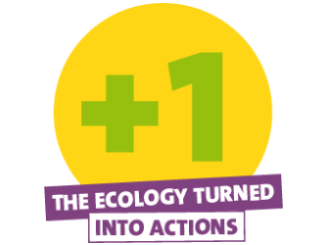The "+1, the ecology turned into actions" closed its 2022 cycle on employment and inclusion within the context of ecological transformation on 29 November. The challenge of this consultation mechanism was to explore the practical and organisational issues and systems, currently existing or yet to be devised, in order to implement our ecological ambitions. This involvement of 50 Veolia stakeholders has produced leads for reflection and action.

Transferring skills for a more inclusive transition
"How can we design a fair and balanced transition and training that encourages the move to action?” was the issue that opened the third session of +1.
Faced with ecological emergency, the transformation of the professional world has begun. "If certain sectors and professions are going to disappear, we must support the least qualified people", begins Frédérique Lellouche, director of the Comité 21.
At Veolia, Olivier Carlat cites the example of Renault's production site in Flins, France, which has been transformed by its employees into a "circular economy mobility factory". The Social Development Director in charge of the Group's social dialogue emphasises: "We need to rethink identities at work that are based on professional dignity and pride. Support for the changes in business lines must be adapted to each territory. We need an ecological transformation that is fairer in its distribution of work and more inclusive, leaving no one behind”.
Training for action
Throughout history, new trades have emerged while others have disappeared. Referring to the predicted disappearance of many jobs that the ecological transformation will involve, Damien Brochier, head of partnerships and vocational training at CEREQ explains that "the new jobs often hybridise existing skills. We need to help people with 30 years of service in a factory to deploy their skills elsewhere.”
"Training must be the key to taking action" adds Yannick Servant, and the impetus must come from above, according to the co-founder of the Convention des Entreprises pour le Climat, which has just brought together 150 French business leaders to accelerate the actions of the economic world on these issues.
Veolia opts for more targeted training. According to Morgane Vidal, Learning Group Director: "To encourage people to take action, each of our employees acquires knowledge through e-learning, for example on the limits of the planet, and follows training courses targeted according to their job. Using our 'Greenpath' tool, managers measure their environmental impact, salespeople add value to their offers and our buyers measure the ecological footprint of suppliers," she explains.
Other leads
When invited to reflect on the possible changes in their job and their business sector between now and 2030, the "Employees" stakeholder group emphasised the "need to provide support in the face of increasingly restrictive regulations", the "Shareholders" group suggested that participants in the banking and asset management sector take better account of ESG criteria (environmental, social and governance), and the "Planet" group insisted on the deep-seated changes in work, which must more than ever involve “autonomy" and "emancipation", participating fully in the emergence of a “learning society”, which never ceases to “learn for the sake of learning”. Other examples of proposals include making the individual skills assessment systematic at the territorial level, and encouraging transfer of skills between different organisations.
The founder of EChOSOPHIA, Amélie Rouvin adds: "You have to live ecology from the inside".
And regenerative leadership consultant Emmanuelle Aoustin concludes: "The move to action requires creativity, collaboration, alignment with one's own values and the values of the company.”
A deliverable will soon be published, presenting the reflections and actions proposed during this third session of "+1" on employment and inclusion. A review of the 2022 cycle will be held next March and will be an opportunity to announce the continuation of the "+1" collective in 2023.
For more information
On the 2022 cycle:
- Opening corporate governance at the heart of the 2022 cycle of “+1, the ecology turned into actions”






